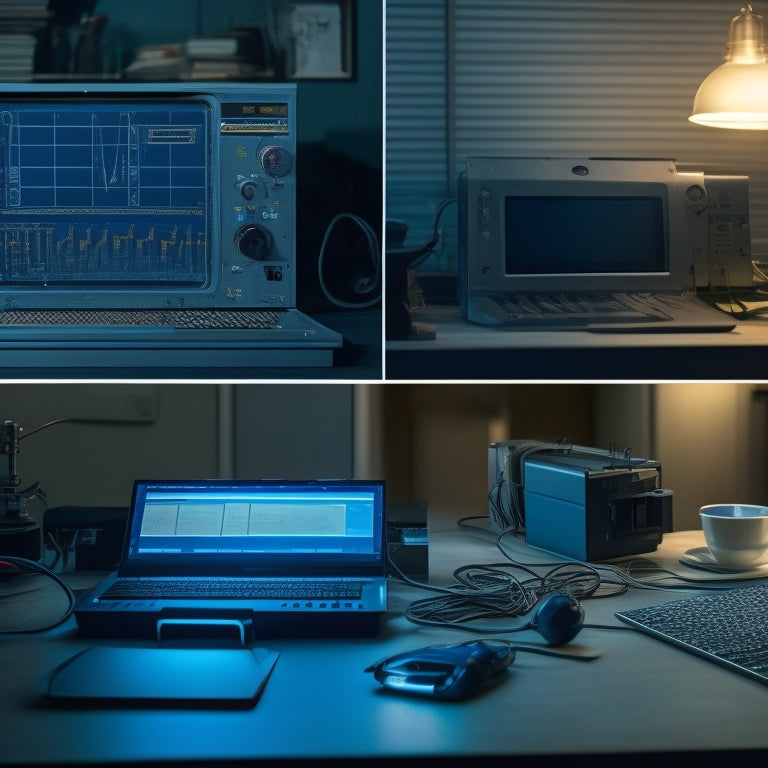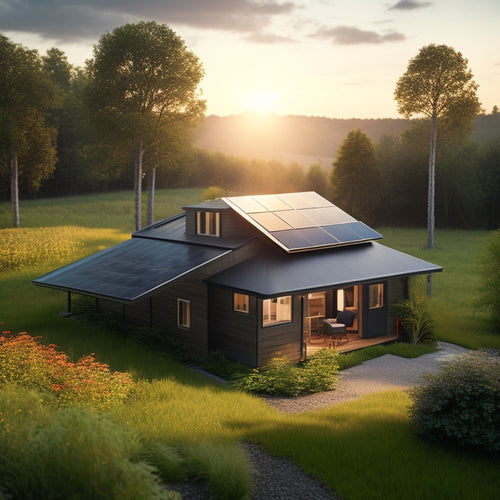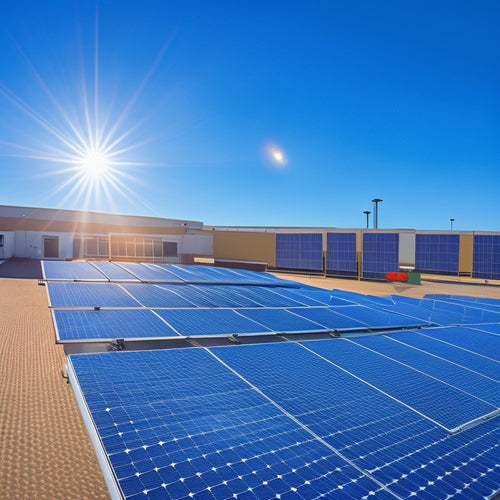
Top 5 Battery Inverter Buying Essentials
Share
When selecting a battery inverter, you'll want to assess your power needs, considering total wattage, surge capacity, and daily energy usage. Next, choose the right inverter type, ensuring compatibility with your devices. Then, determine the ideal battery capacity and size based on your energy requirements and available space. Don't forget to evaluate efficiency and durability factors, such as energy conversion efficiency and thermal management features. Finally, look for certifications like UL and CE, and an all-encompassing warranty that covers parts, labor, and maintenance. By considering these five essentials, you'll be well on your way to finding the perfect battery inverter for your off-grid power needs, and exploring these factors further will reveal the best fit for your unique situation.
Overview
- Calculate total power requirements considering surge capacity, daily energy usage, and roof space for accurate inverter sizing.
- Choose an inverter type (modified sine wave, pure sine wave, or grid-tie) based on device compatibility and energy needs.
- Determine required battery capacity based on energy needs, installation space, and consider small, medium, or large capacity options.
- Look for high-efficiency inverters (>95% conversion efficiency) with durability features like thermal management for reliable off-grid power supply.
- Ensure certification from UL, CE, or ISO and a comprehensive warranty (5-10 years) for safety assurance and investment protection.
Determine Your Power Needs
When sizing up a battery inverter, your power needs are the North Star that guides your purchase decision. You must calculate your total power requirements, considering factors like solar integration and load management. This involves tallying up the wattage of your essential appliances, such as lights, refrigeration, and communication devices.
Be certain to account for surge capacity, as some devices require more power during startup. To guarantee accurate sizing, evaluate daily energy usage and roof space to determine the right inverter capacity for your system. Your inverter should be able to handle these peak demands.
Consider your energy usage patterns, too - will you need to power your system during the day or night? By accurately evaluating your power needs, you'll ensure your battery inverter can reliably meet your energy demands, giving you the freedom to live off the grid.
Inverter Type and Compatibility
Most battery inverters fall into one of three categories: modified sine wave, pure sine wave, or grid-tie inverters.
You'll need to choose the right type based on your power needs and equipment compatibility. Modified sine wave inverters are suitable for simple systems, but may not work with sensitive electronics.
High-efficiency inverter options with high conversion efficiency ratings typically above 95% are essential for maximizing energy harvesting and minimizing transmission losses.
Pure sine wave inverters, on the other hand, provide a clean and stable output, making them ideal for powering devices like laptops and televisions.
Grid-tie inverters synchronize with the grid, allowing you to sell excess energy back to the utility company.
When selecting an inverter, consider its features, such as surge capacity, efficiency, and protections, as well as installation guidelines, like mounting requirements and wiring specifications.
Battery Capacity and Size
You'll need to determine the required battery capacity and size based on your energy needs and available space. This is vital to guarantee you can power your appliances during an outage and have enough room for installation. Consider your energy usage patterns, the type of appliances you want to power, and the installation location's constraints.
| Battery Capacity | Installation Considerations |
|---|---|
| Small (1-5 kWh) | Ideal for small homes, apartments, or offices with limited energy needs |
| Medium (5-10 kWh) | Suitable for average-sized homes with moderate energy requirements |
| Large (10-20 kWh) | Best for large homes, commercial spaces, or those with high energy demands |
| Custom | Requires specialized design and installation for unique energy needs or spaces |
When selecting a battery, consider the technology used, such as lithium-ion or lead-acid, and its impact on the overall system's performance and durability.
Efficiency and Durability Factors
Now that you've determined the required battery capacity and size, it's time to focus on the efficiency and longevity factors of your battery inverter system.
When it comes to efficiency, you want a system that can convert energy with minimal loss. Look for an inverter with a high energy conversion efficiency rating, usually above 95%. This guarantees that most of the energy from your batteries is used to power your appliances, rather than being wasted as heat.
Consider the importance of energy storage capacity and how it affects the overall performance of your system. A high-capacity inverter can provide more power in smaller spaces, making it ideal for space-limited applications.
Durability is also essential, as it directly affects the lifespan of your system. Consider an inverter with sturdy thermal management, which prevents overheating and prolongs its service life.
A reliable inverter will give you the freedom to enjoy uninterrupted off-grid power.
Certification and Warranty Support
Several key certifications can instill confidence in your battery inverter system's performance and safety. You should look for certifications from reputable organizations like UL, CE, and ISO, which guarantee your inverter meets strict safety and performance standards.
Compliance with these certification standards assures your system operates within specified parameters, reducing the risk of electrical shock, fire, or other hazards.
When evaluating warranty support, consider the warranty duration and what it covers. A thorough warranty that lasts for 5-10 years can provide peace of mind and protect your investment.
Check if the warranty covers parts, labor, or both, and if it includes any maintenance or repair services. A reliable warranty support can save you from unexpected expenses and guarantee your system operates smoothly over its lifespan.
Frequently Asked Questions
Can I Install a Battery Inverter Myself or Do I Need a Professional?
You're wondering if you can install a battery inverter yourself; while it's possible, consider the installation safety risks and DIY considerations, as improper setup can lead to electrical shock, fires, or system failure, so it's recommended to hire a professional.
How Often Should I Replace the Batteries in My Inverter System?
You'll need to monitor your battery lifespan, checking for replacement indicators like capacity reduction, increased self-discharge, and physical damage, typically every 5-7 years, to guarantee peak inverter system performance and prevent unexpected downtime.
Can I Use a Battery Inverter With a Generator or Solar Panel?
You can use a battery inverter with a generator or solar panel, as they're designed for compatibility; however, you'll need to guarantee proper generator power management to avoid conflicts and optimize your off-grid freedom.
Do Battery Inverters Have Built-In Charging Capabilities?
You'll find that most battery inverters do have built-in charging capabilities, but it's essential to understand that charging efficiency varies depending on inverter types, such as PWM or MPPT, which notably impact your off-grid power system's overall performance.
Are Battery Inverters Compatible With All Types of Electrical Loads?
You'll find that not all battery inverters are compatible with every electrical load type, as inverter efficiency varies depending on the load's characteristics, such as resistive, inductive, or capacitive loads, so it's essential to match the inverter to your specific load requirements.
Ready to Buy
As you prepare to invest in a battery inverter, remember that it's like building a strong foundation for your off-grid dreams. A weak base can topple the entire structure, but a solid one can weather any storm. By considering these top 5 buying essentials, you'll be well on your way to creating a reliable and efficient power system that will keep your lights on and your devices charged for years to come.
Related Posts
-

Diy Off Grid Solar
By embracing DIY off-grid solar, you can break free from grid dependence, slashing your energy bills by up to 90% and...
-

Replacing Old Appliances With Sustainable Alternatives
Replacing old appliances with sustainable alternatives can change your home into an energy-efficient space. Not only ...
-

Essential Solar Panel Mounts for Commercial Properties
When it comes to essential solar panel mounts for your commercial property, durability and wind resistance are key fa...


